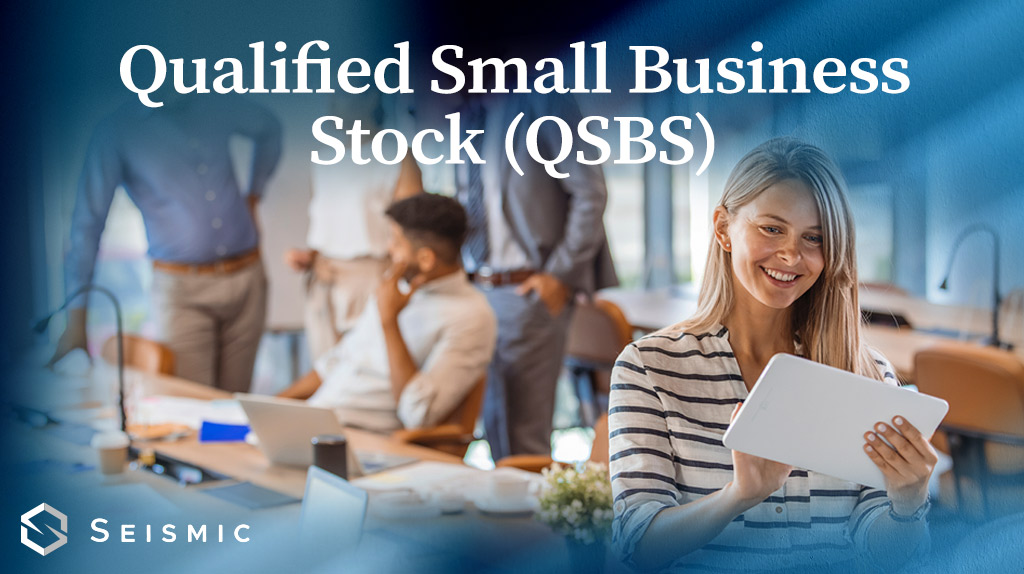Webinars
Q&A from the Webinar:
To invest in Seismic, click here.
Click here to read our offering circular.
Investors of $50,000 and more, please contact Alice Neuhauser apn@seismic.company
Important Clarifications from The Webinar:
- In the discussion of “QSBS Packing”, a comment was made about transferring $49 million of value from an LLC into a C corporation. We may have confused some viewers as to what the total capital gains tax exclusion in the example might be. It’s $49 million x 10, or $490 million.
- In the discussion of who can purchase QSBS, it’s important to note that corporations are allowed to purchase the stock of a QSBS but they cannot use the capital gains tax incentive. Seismic (and likely any QSBS issuer) welcomes corporate buyers. Individual buyers, LLCs, Trusts, Partnerships, Subchapter S entities all can take advantage of the QSBS benefit.
Link to Today’s Presentation:
Click here to view the presentation.
Q&A:
Q. Why doesn’t everyone offer Qualified Small Business Shares?
A. Some businesses – like farming or banking – are prohibited. Beyond that, some businesses aren’t set up for potentially huge gains in their stock price. And, going even further, there’s a lot of bookkeeping that has to take place, and a lot of rules to follow. Starting a new business is hard enough without the complications of trying to accomplish a QSBS benefit. But for those that do, the benefit to the investor – if things go mostly right – is significant.
Q. I’m not sure my tax advisor is familiar with QSBS. What should I do?
A. Ask your advisor to find out. The tax section is 1202. The rules are in the tax code, and the advisor can find many articles online about how to interpret them. You also can hire an advisor who specializes in QSBS, or an attorney. They aren’t hard to find.
Q. You said the QSBS benefit is available in most states. Which ones don’t have it?
A. First of all, the federal exemption is federal, so it’s available everywhere. Most states follow the federal guidelines for capital gains taxes. For those that don’t, generally, you’ll only pay the state rate and still not the federal. For example, California taxes capital gains as ordinary income, so those of us based here could pay up to 13.3% at current rates if we have a gain in our shares. (In any case that’s better than paying a federal tax of 20% PLUS the state tax of up to 13.3%) If the federal taxes weren’t excluded, the rate could be much higher. Texas and Florida, by contrast, don’t have any state income tax anyway so the QSBS benefit is reserved only for federal taxes for taxpayers in those states. The best suggestion I can give is to check with your tax advisor about both the state of incorporation and the state where you live. Hawaii, for example, has special rules for issuers.
Q. I’m starting a company. Do you have an expert who can help me do what I need to do to get set up.
A. We do, but our attorney probably doesn’t want us blasting names out via a webinar. Send me an email – spw@seismic.company — and ask me for an intro.
Q. What portion of Seismic’s portfolio is comprised of companies Seismic incubated versus companies Seismic invested in?
A. As noted, we are about to make our first investments. Both of these companies were started outside of Seismic. We have worked with them both extensively to get them to a point where we are able to make the investment.
Q. Will shareholders in Seismic obtain shares in the underlying portfolio companies or just in the corporate Seismic entity?
A. Seismic, as a holding company, owns 100% of the shares of the companies that we are growing. Your shares in Seismic give you an indirect, proportional stake in every company that is in our portfolio so long as you hold your Seismic shares. Down the road, in order to maintain our holding company status, there may be circumstances where we distribute shares of the subsidiary companies to our shareholders, most likely after (or as part of) taking these companies public or selling them privately.
Mark Your Calendars – First Thursdays schedule
10am Pacific Time / 1pm Eastern Time
Each session is 15 minutes or less
December 1, 2022 – Get an understanding of how our holding company structure works, and how it benefits you – It’s all about control, and ratios, and about creating a better structure for venture companies to thrive.
January 5, 2023 – START OFF THE YEAR learning about Underwriting for successful venture capital investments – How we reach an investment decision – and why you shouldn’t try to do this yourself.
February 2, 2023 – How we look at diversification as we build a portfolio – We don’t keep all our eggs in one basket, and neither should you!
March 2, 2023 – Commitment to sustainability – How this will improve our bottom line … and the world.
April 6, 2023 – Why diversity and inclusion make a difference – How we are seeking out non-traditional entrepreneurs.
May 4, 2023 – KYC and AML considerations when selling to the retail public – Why we go beyond just following the law.

